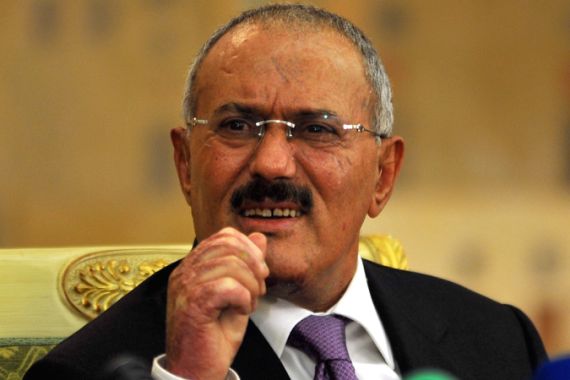
The future of US policy in Yemen
What would be the consequences of the White House accepting to host Yemen’s president?
Ali Abdullah Saleh, Yemen’s outgoing president, has asked to come to the US.
|
“There’s going to be a pretty vigorous debate within the administration, within policy circles, because what message does this send to the protesters in – Andrew Axum, a Middle East analyst |
Saleh has ruled Yemen for 33-years and Barack Obama, the US president, like his predecessor George Bush, regards him as a critical ally in the fight against al-Qaeda.
But thousands of Yemenis have been protesting for months calling for Saleh to step down and hundreds have been killed by government security forces.
In November, Saleh signed an agreement in Saudi Arabia, according to which he pledged to resign after next year’s elections. In return, he was promised immunity from prosecution for crimes such as the killing of protesters during his rule.
But going forward, there are several issues for the US in Yemen.
Firstly, there is the ongoing fight against al-Qaeda in the Arabian Penninsula (AQAP), which the US calls a great threat to American security. It was in Yemen that accused al-Qaeda cleric Anwar al-Awlaki became the first US citizen to be killed in a CIA drone strike.
Another issue is the Yemeni government’s ongoing struggle against the Houthi fighters in the north. Both, Saleh and the Saudi government accuse Iran of supporting the Houthis – a charge denied by the fighters as well as Tehran.
|
“The motivation is to distance Saleh from political developments in Yemen, to allow them to proceed in a more positive direction, and to get through this – Edmond Hull, a former US ambassador to Yemen |
And as elsewhere in the region, the question that remains for Washington is: Will a truly democratic government give the US permission to continue its covert war against its perceived enemies, most notably its campaign of drone strikes in Yemen?
Although Saleh was injured in a rocket attack in June and he is still recovering from his wounds, he denied that was the reason for wanting to travel to the US.
So if Saleh travels to the US, would it be seen as White House support for a despot with blood on his hands? And what is the future of US policy in Yemen?
Inside Story Americas discusses with guests: Abdullah Al-Saidi, Yemen’s former ambassador to the United Nations and a senior fellow at the International Peace Institute; Edmond Hull, a former US ambassador to Yemen and author of a book on al-Qaeda in Yemen; and Andrew Exum, a Middle East analyst and blogger and a senior fellow at the Center for a New American Security.
|
“I will go to the United States. Not for treatment, because I’m fine, but to get away from attention, cameras, and allow the unity government to prepare properly for elections. I want to be away for the elections, because whether it fails or succeeds people may blame the president.” Ali Abdullah Saleh, Yemeni president |